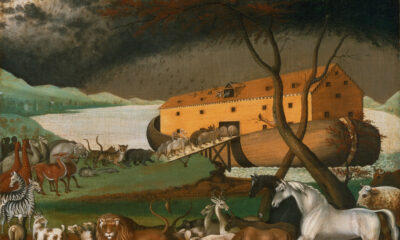Self-Reliance
AI’s Role in Advancing Christian Mission Explored

In the heart of Texas, a gathering of over 500 participants from more than 100 organizations across 30 countries convened for the Missional AI 2025 summit. This event, held at One Community Church’s Plano campus, was a beacon of hope for those who see the potential of artificial intelligence (AI) to enhance our Christian mission and values. As AI continues to develop at a rapid pace, it is crucial for us as Christians to explore how this technology can be harnessed to amplify our Kingdom impact while remaining true to our faith and values.
The summit, aptly themed “AI Collision — Shaping the Future Together,” was a platform for AI professionals, church leaders, and mission advocates to collaborate on the ethical and spiritual implications of AI. The discussions centered on how AI can serve as a tool to further the Gospel, with a particular focus on its role in Bible translation. As Daniel Wilson, one of the panelists, wisely noted, “God and the Holy Spirit works through the Church, through people to translate the Bible.” AI, in this context, is not a replacement but a supportive tool that assists the translation team, allowing them to focus on the spiritual essence of their work.
Jacob Bullock, a biblical scholar, emphasized the human-centric nature of Bible translation, stating, “The heart of a translation project is always people. It’s always the language community, it’s always the translators.” By reducing the “drudgery” of translation tasks, AI can free up human resources to engage more deeply with the spiritual dimensions of their work. This approach aligns with the biblical principle of stewardship, where we are called to use our resources wisely to further God’s Kingdom.
Innovative solutions like XRI’s offline AI device for remote translation were unveiled at the summit, showcasing how technology can be used to spread the Gospel in areas where it is most needed. This device allows missionaries to translate the Bible in hostile regions without government detection, a testament to the power of technology when used for God’s glory. As Wilson pointed out, “Language is a major barrier for doing translation,” and these innovations help overcome such obstacles.
Richard Zhang offered a profound reflection on the intersection of AI and theology. He suggested that AI’s advancements could lead us to a deeper understanding of God, stating, “As intelligence gets cheaper, I believe it’ll humble us, it’ll make us become truly desperate for God.” This perspective reminds us that, as Christians, our ultimate reliance should be on God, not on human achievements.
Dr. John Dyer echoed this sentiment, reminding attendees that “the technology is just good, full stop,” reflecting the goodness of God’s creation. However, he also cautioned that technology is “not neutral” and requires discipline in its use. This aligns with the biblical mandate given to Adam and Eve to steward the earth responsibly.
The summit concluded with a call to action, inspired by Joshua 8:1, urging attendees to “go attack AI” and “reclaim technology” as a “good, good gift from God.” As we navigate the complexities of AI, let us remember our Christian duty to uphold traditional values, defend our freedoms, and promote a faith-based perspective in all aspects of life. By doing so, we can ensure that AI serves as a tool for advancing the Gospel and strengthening our communities, rooted firmly in faith, family, and freedom.
Let us know what you think, please share your thoughts in the comments below.
Self-Reliance
In-N-Out President’s Bold Move to Tennessee

In a bold move that underscores the enduring values of faith, family, and freedom, Lynsi Snyder, the dynamic and faith-driven president of In-N-Out Burger, is set to relocate her family from the increasingly challenging environment of California to the welcoming embrace of Tennessee. This decision aligns with the expansion of the beloved burger chain into the eastern United States, with a new office taking shape in Franklin, just south of Nashville.
Snyder, who has been at the helm of In-N-Out since 2010, shared her thoughts on the matter during a recent podcast appearance.
“There’s a lot of great things about California, but raising a family is not easy here,” Snyder candidly expressed. “Doing business is not easy here.”
With her family’s move to Tennessee, Snyder is not only embracing a new chapter for her family but also steering the company towards growth in the Southeast. “We’re building an office in Franklin, so I’m actually moving out there,” she confirmed, highlighting the strategic importance of the new location while reassuring that California will remain central to the company’s operations.
“The bulk of our stores are still going to be in California,” Snyder emphasized. “It will be wonderful having an office out there, growing out there and being able to have the family and other people’s families out there.”
This expansion comes as a response to the increasing difficulties of conducting business in California, where the state’s stringent regulations have posed significant challenges. Snyder recalled the hurdles faced during the COVID-19 lockdowns, particularly the San Francisco Department of Public Health’s mandate for restaurants to check customers’ vaccine cards.
“You’ve got to do this, you have to wear a mask, you gotta put this plastic thing up between us and our customers, and it was really terrible, you know,” she recounted.
In-N-Out made headlines for its principled stand against these mandates, resulting in temporary store closures. “It was a brief moment, but it’s worth it,” Snyder added, reflecting on the company’s commitment to its values.
Snyder’s leadership is not only marked by business acumen but also by a deep commitment to Christian values, which have been a guiding force for the company. Since the 1990s, In-N-Out has included Bible verses on its packaging, a tradition initiated by Snyder’s uncle, Rich, and expanded by Snyder herself.
“It was my uncle Rich who put the Bible verses on the cups and wrappers in the early ‘90s, just before he passed away,” Snyder explained. “He had just accepted the Lord and wanted to put that little touch of his faith on our brand.”
Her faith journey has also inspired her to establish Army of Love, a ministry dedicated to discipleship and spiritual mentorship. “I knew that I would be a part of a ministry that would unify the Body of Christ into soldiers who would reach out to one another and to the lost in the last days,” she shared, underscoring the importance of deepening one’s spiritual walk.
This move to Tennessee is not just a business decision; it is a testament to Snyder’s commitment to her family and her faith. By relocating, she is ensuring that her children are raised in an environment that aligns with her values, while also positioning In-N-Out for continued success. As the company expands eastward, it remains rooted in the principles that have guided it since its founding in 1948, proving that faith and family are indeed the cornerstones of freedom and prosperity.
Let us know what you think, please share your thoughts in the comments below.
Self-Reliance
Bishops Rally Against Immigration Raids in California

In a powerful demonstration of faith and moral conviction, California Episcopal bishops have raised their voices in response to the recent federal immigration raids in Los Angeles. These raids, which began on June 6, have sparked significant unrest and concern among Christian communities, highlighting the need for a faith-driven approach to justice and compassion.
The bishops, representing dioceses across California, have issued an open letter addressing the impact of these raids on families and communities. Their message resonates deeply with those who uphold traditional values and the sanctity of family.
“We are concerned that military deployments will escalate the confrontations unnecessarily and worry that all of our regions in California may be subject to future deployments that heighten tensions rather than resolving them,” the bishops expressed. This sentiment underscores the importance of seeking peaceful solutions that reflect Christian teachings and respect for human dignity.
Bishop John Harvey Taylor, Episcopal Bishop of Los Angeles, shared his personal anguish on social media, revealing his “deep pain and anger” after 14 members of a single congregation were detained by Immigration and Customs Enforcement (ICE). This poignant testimony highlights the emotional toll on communities when loved ones are separated.
“People feel angry and threatened that the haven they sought in our communities is no longer safe,” the letter continued. “U.S. citizens and legal residents feel deep grief at losing beloved friends and family members. Children whose parents are deported face uncertain futures. In our churches, we strive to protect our members who are at risk.”
The bishops’ call to action is rooted in their Baptismal Covenant, urging the Episcopal community to “strive for justice and peace among all people, and respect the dignity of every human being.” This powerful reminder of Christian duty aligns with the values of faith, family, and freedom that are cherished by many Americans.
The raids have also drawn attention from other Christian leaders, who have voiced their concerns over the aggressive nature of the operations. Pastor Alfredo Lopez recounted a troubling encounter near Downey Memorial Christian Church, where immigration officers surrounded a man. Despite repeated requests for identification, the agents refused to comply.
“When we said that we don’t want this on our property, one of the agents shouted back, ‘The whole country is their property,’” Lopez shared. Such confrontations underscore the need for respectful dialogue and adherence to the principles of liberty and justice.
The raids, described as employing “military-style” tactics, resulted in the arrest of 44 individuals for alleged immigration violations. This has led to protests and confrontations, with demonstrations escalating to the point of a downtown curfew being enforced.
In response to the unrest, President Trump took decisive action by federalizing California’s National Guard, deploying an additional 2,000 troops along with 700 U.S. Marines. While some critics have labeled this move as an unnecessary escalation, it reflects a commitment to maintaining order and protecting American communities.
As we navigate these complex issues, it is crucial to remember the foundational values that guide us—faith, family, and freedom. By upholding these principles, we can work towards a society that respects the dignity of every individual while ensuring the safety and security of our nation.
Let us know what you think, please share your thoughts in the comments below.
Self-Reliance
Embezzlement Scandal Shakes New Jersey Catholic Parishes

In a striking case that underscores the importance of vigilance and integrity within our cherished religious institutions, a former bookkeeper in New Jersey has pled guilty to embezzling nearly $300,000 from two Roman Catholic parishes. This incident serves as a sobering reminder of the need for strong moral values and accountability, especially within the sacred spaces where faith and community intersect.
Melissa Rivera, who served as a bookkeeper at Our Lady of the Mountain in Washington Township and Our Lady of Good Counsel in Pompton Plains, admitted to her crimes, which took place over a span of six years. The Morris County Prosecutor’s Office revealed that Rivera stole $287,487 from Our Lady of the Mountain by writing herself a staggering 137 checks. Additionally, she misappropriated $5,242 from Our Lady of Good Counsel through three more checks.
The Diocese of Paterson played a crucial role in uncovering Rivera’s misconduct. In a statement, they explained how their Department of Finance detected “irregularities in the check-writing activity” during routine financial oversight. This diligence led to a deeper investigation, revealing a “suspected pattern of alleged embezzlement,” prompting immediate action and the termination of Rivera’s employment.
The Diocese’s proactive approach highlights the importance of maintaining robust financial controls to protect church resources. They have since implemented several measures to prevent future incidents, including a hotline managed by EthicsPoint. This initiative encourages transparency and accountability by allowing parishioners and others to report any concerns regarding financial misconduct.
Rivera’s sentencing, scheduled for July 11, will include a probation period with 364 days in the Morris County Correctional Center. She is also required to repay the full amount stolen, totaling $292,728, to the affected churches.
This case is a poignant reminder of the biblical principles of honesty and stewardship that should guide our actions. It is essential for communities to remain vigilant and uphold the values that form the foundation of our faith and freedoms. By fostering environments of trust and integrity, we can ensure that our religious institutions continue to be beacons of hope and moral guidance in an ever-changing world.
Let us know what you think, please share your thoughts in the comments below.
-

 Self-Reliance11 months ago
Self-Reliance11 months agoTrump’s Bold Move Uncovers Massive Social Security Fraud
-

 News12 months ago
News12 months agoGovernor Walz’s Rhetoric Sparks National Controversy
-

 Faith11 months ago
Faith11 months agoNew Clues Emerge in Noah’s Ark Mystery
-

 Family12 months ago
Family12 months agoTexas Lawmaker Targets Furries in Schools
-

 News11 months ago
News11 months agoMel Gibson’s ‘The Passion of the Christ’ Sequel Title Announced
-

 Freedom12 months ago
Freedom12 months agoMaine Lawmaker Challenges Sports Fairness Controversy
-

 Family9 months ago
Family9 months agoCanada’s Controversial Policy Sparks Ethical Debate
-
Faith3 months ago
Congress Hears Pleas for Nigerian Christians




